|
|
|
Sort Order |
|
|
|
Items / Page
|
|
|
|
|
|
|
| Srl | Item |
| 1 |
ID:
097215
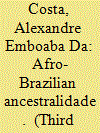

|
|
|
|
|
| Publication |
2010.
|
| Summary/Abstract |
This article 'thinks with' an Afro-Brazilian mobilisation of ancestralidade (ancestrality) as a means to explore, unmask and mark the centrality of 'race' in development. In contrast to thinking about race as cultural difference necessitating inclusion in development, thinking with Afro-Brazilian knowledge aims to rework the very category of development. 'Thinking with' engages critical knowledge emerging out of Afro-Brazilian struggles to forward a theory and practice of substantive political, institutional and social transformation. The article juxtaposes the culturalisms of national ideology and multicultural development policies with ancestralidade as a dynamic political practice that contests capitalism's racialised hierarchies while embodying another sociality of development. An analysis of one cultural centre's efforts to restructure the school curriculum demonstrates that the 'past' of racialised capitalism and ancestral memory are each contemporary projects which evince the relational formation and contested meaning of 'race' in development.
|
|
|
|
|
|
|
|
|
|
|
|
|
|
|
|
| 2 |
ID:
180472
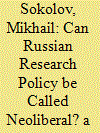

|
|
|
|
|
| Summary/Abstract |
National research evaluation systems that use metrics for the assessment of academic institutions are usually regarded as exemplifying the same neoliberal model of governance that, with minor variations, is implemented worldwide. This essay argues, however, that despite apparent similarities, metrics are used for different aims in different national cases. It compares the use of figures in the UK RAE/REF, a prototypical neoliberal framework, with various schemas of assessment that have been used to evaluate Russian universities in recent decades. It argues that in the RAE/REF, the principal role of statistics is to solve ‘the lazy agent’ problem by creating a prisoner's dilemma for academic institutions, while in the Russian case, statistics serve to solve ‘the corrupt knower’ problem, preventing collusion between the assessor and the assessed. The essay concludes by putting forward some hypotheses on the origins of different approaches to quantification.
|
|
|
|
|
|
|
|
|
|
|
|
|
|
|
|
| 3 |
ID:
189938
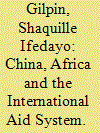

|
|
|
|
|
| Summary/Abstract |
The China–Africa relationship has received increased interest over the past few decades as scholars critically examine the challenge that China, in its quest for a closer strategic partnership with Africa, poses to the norms governing the neoliberal world order (NLWO). One crucial aspect of this is international aid, and how Chinese aid to Africa differs from Western aid. This paper argues that Chinese aid reduces the power of traditional aid donors to shape the development route of African countries. This new development finance ultimately breaks the monopoly of Western aid to decide how poor countries in the global ‘South’ develop. In doing so, the Sino–African aid relationship is challenging the current world order as it offers African states the possibility to decouple (or delink) themselves from the global economy. By challenging assumed neoliberal economic development fundamentals, this relationship, if harnessed correctly by African leaders, can pose longer-term ideological questions around the very set of ideas that underpin development itself, while enabling African states the policy space needed to pursue more sustainable development from an Afro-centric perspective. It is this possibility to delink, due to changing ideological fundamentals concerning economic development, that is the challenge China and Africa pose to the NLWO.
|
|
|
|
|
|
|
|
|
|
|
|
|
|
|
|
| 4 |
ID:
188564
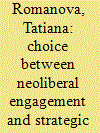

|
|
|
|
|
| Summary/Abstract |
This article explores the dynamic coexistence of neoliberal and realist narratives in the EU's discourse on international green cooperation with a focus on Russia. Using critical discourse analysis and critical geopolitics, the article explores how the neoliberal and realist narratives were applied in the EU's international (Russia-focused) energy transition cooperation. The neoliberal narrative presupposed fine-tuned multilateralism and market openness, with an opportunity for Russia to join the EU's success story. The realist narrative was based on the notions of relative gains, strategic autonomy/sovereignty, market corrections by public authorities, borders and closed alliances, Russia was used in this narrative to encourage more EU autonomy and strategic partnerships. The article demonstrates how and why the geopolitical narrative was strengthened between 2020 and 2021. It reveals the similarities between the neoliberal and realist narratives regarding the policy framework and relative positions of the EU and Russia in the spacialisation of the green energy policy. As a result, no policy opening for selective engagement with Russia emerged; rather, the 2020–2021 discourse prepared the EU for a policy shift that it took to react to Russia's assault against Ukraine in February 2022.
|
|
|
|
|
|
|
|
|
|
|
|
|
|
|
|
| 5 |
ID:
097212
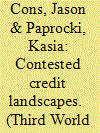

|
|
|
| 6 |
ID:
151522
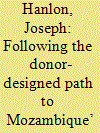

|
|
|
|
|
| Summary/Abstract |
Strenuous efforts by donors and lenders over four decades turned Mozambique from a socialist success story into a neoliberal capitalist one. The private sector dominates; a domestic elite dependent on foreign companies has been created. But a secret US$2.2 billion arms and fishing boat deal involving Swiss and Russian banks and Mozambican purchases from France, Germany, and Israel, with large profits on all sides, was a step too far down the donor’s capitalist road. The International Monetary Fund cut off its programme and western donors ended budget support.
|
|
|
|
|
|
|
|
|
|
|
|
|
|
|
|
| 7 |
ID:
124213
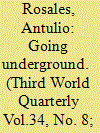

|
|
|
|
|
| Publication |
2013.
|
| Summary/Abstract |
This article argues that South America's 'revolutionary' left turn can be best explained by its assertion of state property over natural resource extraction. The recent history of the leftist movements in Venezuela, Bolivia and Ecuador relates to the failures of the neoliberal reforms applied in the region decades before, hence the dismantling of core orthodox policies has been critical for them once in power. This has been possible through the expansion of state action in the economy, but mainly through the governance of hydrocarbon extraction and the control of subsoil rents. Resource extraction has been central to the political economy of Andean left-wing revolutionaries, responsible for many of their successes but also their impending challenges. This rearticulation of underground governance is linked to global transformations that give prominence to emerging economies and reinforces these countries' position in the world economy as providers of primary commodities.
|
|
|
|
|
|
|
|
|
|
|
|
|
|
|
|
| 8 |
ID:
098373
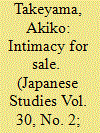

|
|
|
|
|
| Publication |
2010.
|
| Summary/Abstract |
This article examines the creation of entrepreneurial male subjects in Japan's host clubs. Based on my ethnographic study, I argue that hosts' entrepreneurship is constituted by commodifying themselves. This paradoxical - commodified, yet entrepreneurial - male subject is embedded in the new possibilities and constraints posed by Japan's neoliberal restructuring and global economic trends. Hosts, who dream of earning fast cash and achieving upward class mobility, perceive the hosting business as a gateway to success, fame, and luxurious lifestyles. As a result, they 'voluntarily' commodify themselves and feed into the club's profit-making. They are also exploiting the consumer logic of desirability and the neoliberal values of entrepreneurship. By doing so, they hope to better position themselves in contrast to the work ethic and status of Japan's conventionally hegemonic masculine icon, the Salaryman. I contend that neoliberal reform in Japan is not a mere politico-economic reaction to globalization, but a socio-historically specific situation in which individual desires, Japan's social values and ethics, and global economic trends discursively intersect, align, and produce a new mode of attachment to individual freedom and flexible accumulation of capital.
|
|
|
|
|
|
|
|
|
|
|
|
|
|
|
|
| 9 |
ID:
058966
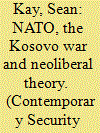

|
|
|
| 10 |
ID:
097574
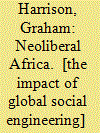

|
|
|
|
|
| Publication |
London, Zed Books, 2010.
|
| Description |
178p.
|
| Standard Number |
9781848133198, hbk
|
|
|
|
|
|
|
|
|
|
|
|
Copies: C:1/I:0,R:0,Q:0
Circulation
| Accession# | Call# | Current Location | Status | Policy | Location |
| 055083 | 337.096/HAR 055083 | Main | On Shelf | General | |
|
|
|
|
| 11 |
ID:
170874
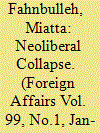

|
|
|
| 12 |
ID:
085175
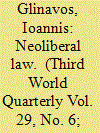

|
|
|
|
|
| Publication |
2008.
|
| Summary/Abstract |
This paper offers a critical evaluation of the interrelation of law and economics in the context of development. The paper describes the current promotion of law reform by international institutions like the World Bank as the product of neoliberal economic theory. The analysis examines the role of law historically as an expression of economic orthodoxy, arguing that the Washington Consensus has determined the shape of law reforms, pointing them to the definition and protection of private property rights, aiming to separate politics from economics. The relative failure of these policies in their application to countries emerging from communism led to the expansion of the reform agenda to include market-supporting institutions, among them the rule of law. The paper assesses the extent to which this expansion means that the role of the law and the relationship of regulation to market have changed sufficiently to denote a Post-Washington Consensus. It concludes that the use of law reform to impose what neoliberalism considers 'rational' solutions undermines the legitimacy of democratic institutions in developing and transitional countries.
|
|
|
|
|
|
|
|
|
|
|
|
|
|
|
|
| 13 |
ID:
102848
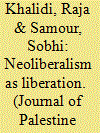

|
|
|
|
|
| Publication |
2011.
|
| Summary/Abstract |
The Palestinian statehood-by-2011 program, framed through neoliberal institution building, redefines and diverts the Palestinian liberation struggle. Focusing on its economic aspects, and in particular the underlying neoliberal thought that goes beyond narrow economic policy applications, this essay argues that the program cannot succeed either as the midwife of independence or as a strategy for Palestinian economic development. Its weaknesses, the authors contend, derive not only from neoliberalism's inability to deliver sustainable and equitable economic growth worldwide, but also because neoliberal "governance" under occupation, however "good," cannot substitute for the broader struggle for national rights nor ensure the Palestinian right to development.
|
|
|
|
|
|
|
|
|
|
|
|
|
|
|
|
| 14 |
ID:
160197
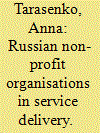

|
|
|
|
|
| Summary/Abstract |
The essay examines the social policy principles underlying state funding schemes that shape the functioning of non-profit organisations in service delivery in Russia. Scrutinising federal and regional financial tools, the analysis reveals that some non-profit organisations are engaged with a neoliberal logic promoting state funding based on competitive grant processes and a means-tested approach to clients, while others seek privileged access to state resources to secure a statist and stratified service provision for their members. The essay argues that neoliberal principles are extended through contracting-out and are undermining statist practices; however, a situation is emerging within competitive outsourcing procedures in which selected organisations are still receiving privileged treatment from the state.
|
|
|
|
|
|
|
|
|
|
|
|
|
|
|
|
| 15 |
ID:
069806
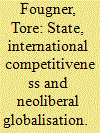

|
|
|
|
|
|
|
|